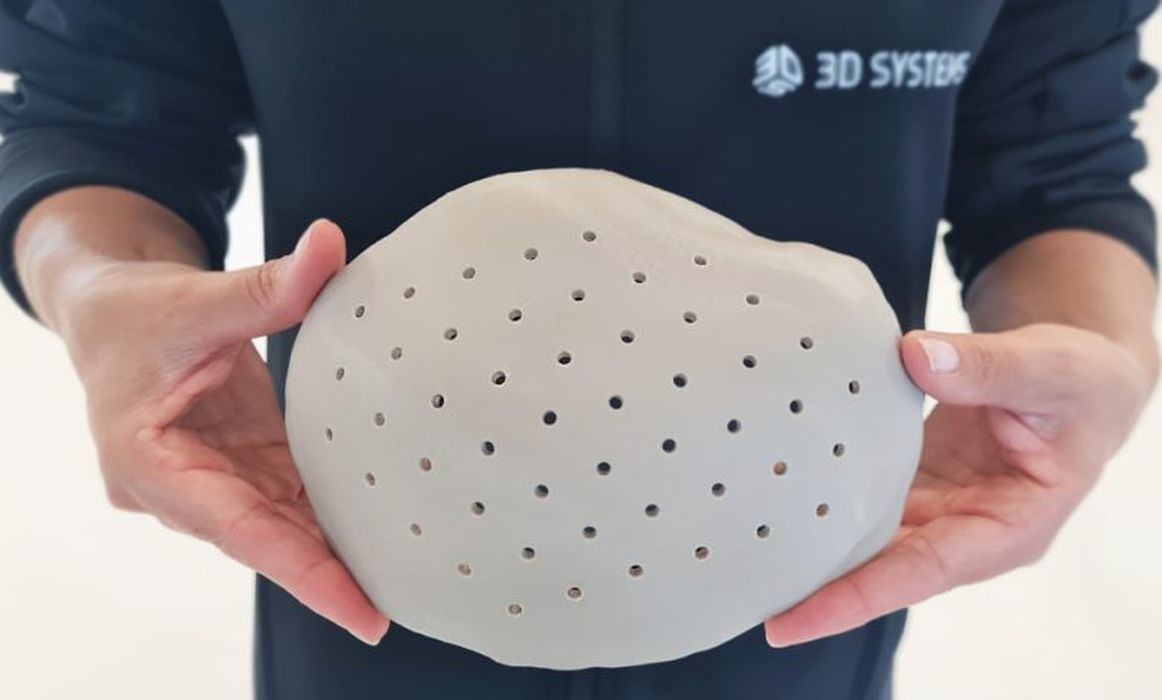
The cranial implants, produced on the company’s EXT 220 MED extrusion platform using Evonik’s VESTAKEEP i4 3DF PEEK material, have been successfully used at the University Hospital Basel, in Switzerland, and Salzburg University Hospital, in Austria.
A patient-specific 3D printed cranial implant, produced using 3D Systems’ point-of-care technologies, was successfully used in a cranioplasty at the University Hospital Basel, in Switzerland.
Under the leadership of Prof. Florian Thieringer, head of the Medical Additive Manufacturing Research Group (Swiss MAM) at the University Hospital Basel’s Department of Biomedical Engineering (UNIBAS DBE), and the Department of Oral and Maxillofacial Surgery (OMFS), in collaboration with Prof. Raphael Guzman and the Department of Neurosurgery, the team employed 3D Systems’ technologies to produce the first cranial implant at the point of care that complies with the current Medical Devices Regulations (MDR).
3D Systems’ extrusion printing technology is unique as its architecture and design are easy to use to produce durable, biocompatible implants using Polyetheretherketone (PEEK) material. Additionally, the technology enables the production of patient-specific geometries at the hospital itself – providing tremendous benefits to both surgeons and patients.
The implant created by the team at University Hospital Basel was used to successfully replace a section of a disintegrating skull in a 46-year-old male who was experiencing complications from a stroke in 2019.
When the patient first entered Prof. Guzman’s care, he was experiencing visual disturbances, severe headaches, and dizziness, and his forehead was sinking due to a disintegrating skullcap. The team under the guidance of Dr. Neha Sharma, Ph.D., first took a computed tomography (CT) scan of the patient’s skull and imported that into software to create a model of the implant, customized to his unique anatomy.
The implant was then produced in the Hospital’s 3D printing lab using Evonik’s VESTAKEEP i4 3DF PEEK on 3D Systems’ EXT 220 MED extrusion platform. PEEK is a desirable material for such applications due to its mechanical properties (i.e., lightweight, resistant to thermal and ionizing radiation, and similar to human bone). 3D Systems’ printing technology has been uniquely engineered to enable healthcare applications within sterile environments.
“The successful implantation at the University Hospital of Basel is a pivotal moment for medical 3D printing, demonstrating its potential to revolutionize patient care,” said Prof. Thieringer. “Our collaboration with hospitals across Europe, along with the invaluable expertise provided by POC APP AG around QMS and regulatory guidelines, showcases the power of advanced technology and collaboration in improving healthcare outcomes.”

3D Systems’ point-of-care solution was also successfully used by a team at Salzburg University Hospital, Department of Oromaxillofacial Surgery, to produce a patient-specific cranial implant for a 55-year-old male, Mr. Rainer Trummer, who suffered from craniosynostosis (i.e., one of the cranial bones ossified too early during childhood, resulting in a deformation of the skull).
These technologies were brought together by the hospital’s in-house clinicians to successfully address the patient’s needs – providing a customized solution that best positioned the team for success. The hospital used Oqton’s D2P software to create 3D models from the patient’s CT images and Oqton’s Geomagic Freeform to complete the design of the patient-specific occipital prosthesis. The cranial implant was also printed using Evonik’s VESTAKEEP i4 3DF PEEK on 3D Systems’ EXT 220 MED extrusion platform.
Read the rest of this story at VoxelMatters
